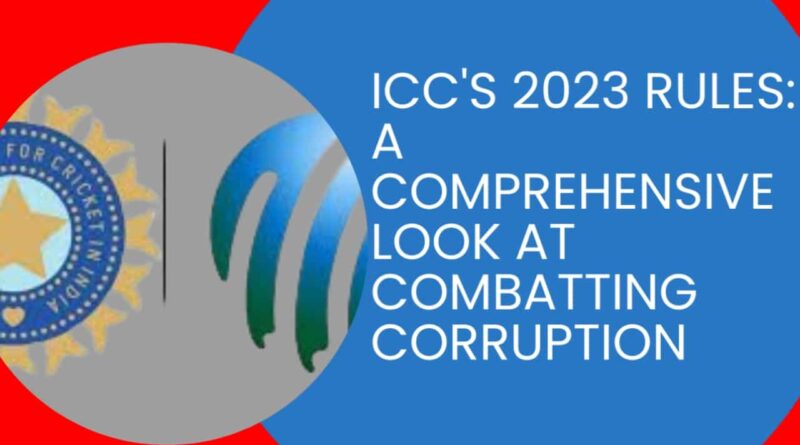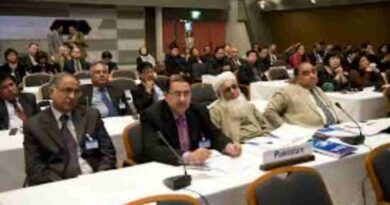ICC’s 2023 Rules A Comprehensive Look at Combatting Corruption
ICC’s 2023 Rules: A Comprehensive Look at Combatting Corruption
What’s new in ICC’s 2023 Rules on Combating
ICC’s 2023 Rules:
Title: Unveiling ICC’s 2023 Rules: A Comprehensive Look at Combatting Corruption

The International Cricket Council (ICC) has recently introduced a set of rules aimed at fortifying its stance against corruption in the sport. As cricket continues to capture the hearts of millions worldwide, maintaining the integrity of the game becomes paramount. Let’s delve into the key features of the ICC’s 2023 rules on combating corruption.
ICC’s 2023 Rules 1. Strengthened Anti-Corruption Code
The cornerstone of the new regulations lies in the bolstered Anti-Corruption Code. The ICC has expanded its provisions, leaving no room for ambiguity. Stricter penalties and a more comprehensive framework for dealing with corruption-related offences aim to deter players and officials from engaging in illicit activities.
2. Innovative Technology Integration
Recognizing the evolving landscape of corruption, the ICC has embraced cutting-edge technology to monitor and prevent malpractices. Advanced surveillance systems, data analytics, and artificial intelligence algorithms will be employed to detect unusual betting patterns, spot-fixing, and other potential threats to the game’s integrity.
3. Education and Awareness Programs
Prevention is key, and the ICC has invested significantly in educational initiatives. Players, officials, and stakeholders will undergo enhanced training programs, equipping them with the knowledge to identify and report corrupt activities. Building a culture of integrity within the cricket community is pivotal in the fight against corruption.
4. Whistleblower Protection: ICC’s 2023 Rules
To encourage individuals to come forward with crucial information, the ICC has implemented robust whistleblower protection mechanisms. Anonymity, legal safeguards, and support structures are in place to shield those who expose corruption, ensuring a more transparent and accountable reporting process.
5. Global Collaboration
Recognizing that corruption knows no borders, the ICC has intensified its collaboration with international law enforcement agencies, cricket boards, and other sports organizations. A united front against corruption is deemed essential, with the sharing of intelligence and best practices becoming a cornerstone of the global effort to safeguard cricket’s integrity.
6. Stricter Player-Agent Regulations
Acknowledging the role of player agents in the realm of corruption, the ICC has imposed tighter regulations on their activities. Enhanced scrutiny, background checks, and mandatory reporting requirements aim to curtail any attempts to compromise players through illicit channels.
7. Updated Betting Regulations
With the proliferation of online betting platforms, the ICC has revised its betting regulations to keep pace with the changing landscape. Clearer guidelines on permissible and impermissible activities, coupled with stringent monitoring, aim to mitigate the risk of match-fixing and spot-fixing associated with betting.
The ICC’s 2023 Rules on Combating Corruption represent a proactive and multifaceted approach to preserving the integrity of cricket. By fortifying its Anti-Corruption Code, embracing technology, prioritizing education, protecting whistleblowers, fostering global collaboration, regulating player agents, and updating betting guidelines, the ICC aims to create a resilient framework that safeguards the spirit of the game.
As cricket enthusiasts, we can take solace in the fact that the guardians of the sport are committed to upholding its values and ensuring a fair and untarnished playing field for generations to come.
ICC’s 2023 Rules: 8. Comprehensive Player Education Modules
The ICC’s commitment to eradicating corruption extends to comprehensive player education modules. These modules delve into the intricacies of corruption, emphasizing the consequences on players, teams, and the sport as a whole.
By imparting a deeper understanding of the risks involved, players are better equipped to make informed decisions, fortifying the sport from within.

9. Random Integrity Audits
In a groundbreaking move, the ICC will conduct random integrity audits, where players, officials, and even support staff may undergo unannounced scrutiny. This proactive measure aims to instil a sense of constant vigilance and serves as a deterrent, ensuring that individuals associated with cricket remain accountable at all times.
10. Independent Oversight Panel: ICC’s 2023 Rules
To enhance transparency and impartiality, the ICC has established an independent oversight panel tasked with reviewing and overseeing the implementation of anti-corruption measures. This panel, comprised of experts in law, ethics, and sports governance, will provide an additional layer of scrutiny to maintain the highest standards of fairness and justice.
11. Lifetime Bans for Repeat Offenders
In a move signalling the ICC’s unwavering commitment to maintaining the purity of cricket, repeat offenders now face the prospect of lifetime bans. This strict stance sends a powerful message that corruption will not be tolerated, and those who attempt to compromise the integrity of the game will face severe and lasting consequences.
12. Increased Collaboration with Betting Regulators
Acknowledging the symbiotic relationship between cricket and the betting industry, the ICC has forged stronger ties with betting regulators. This collaboration facilitates the exchange of information, enabling quicker identification of suspicious activities and potential threats.
By working hand-in-hand with betting authorities, the ICC aims to create a more resilient defence against corrupt practices.
the ICC’s 2023 Rules on Combating Corruption stand as a comprehensive and dynamic framework designed to stay one step ahead of those seeking to compromise the integrity of cricket.
Through innovative measures, stringent penalties, and a commitment to education and collaboration, the ICC is sending a clear message that the battle against corruption is ongoing, and the guardians of the game are resolute in their mission to preserve cricket’s honour and spirit.
As fans, players, and stakeholders, we can take comfort in the knowledge that the ICC is actively shaping a future for cricket that is free from the shadows of corruption.
13. Inclusion of Anti-Corruption Officers in Every Match: ICC’s 2023 Rules
To ensure a constant presence in the cricketing ecosystem, the ICC has mandated the deployment of Anti-Corruption Officers at every match. These officers will actively monitor players, officials, and surroundings, acting as a visible deterrent and a rapid response team in case of any suspicious activities.
This on-the-ground approach strengthens the ICC’s commitment to proactive prevention.
14. Expanding the Definition of Corrupt Conduct
The ICC has broadened the definition of corrupt conduct to cover a wider spectrum of activities that may undermine the integrity of the game. This includes not only direct involvement in match-fixing but also indirect actions that could lead to or support corrupt practices.
By casting a wider net, the ICC aims to address emerging threats and stay ahead of evolving tactics employed by those seeking to compromise the sport.
15. Mandatory Integrity Workshops for Cricket Boards
Recognizing the pivotal role cricket boards play in shaping the ethical landscape of the sport, the ICC has instituted mandatory integrity workshops for administrators and officials.
These workshops focus on fostering a culture of transparency, accountability, and ethical decision-making within cricket organizations, ensuring that the guardians of the sport are well-equipped to lead by example.
16. Global Outreach Campaign Against Corruption
In a bid to involve fans and the wider cricket community in the fight against corruption, the ICC has launched a global outreach campaign.
Through social media, public service announcements, and community events, the campaign aims to raise awareness, educate fans about the risks and consequences of corruption, and encourage a collective commitment to preserving the integrity of cricket at all levels.

17. Adaptive Regulations to Address Emerging Threats
The ICC has demonstrated its agility by incorporating a provision for adaptive regulations. Recognizing the ever-changing landscape of corruption, the governing body can swiftly amend and update its rules to address emerging threats.
This flexibility ensures that the ICC remains at the forefront of the battle against corruption, ready to tackle new challenges as they arise.
Conclusion
The ICC’s 2023 Rules on Combating Corruption represent a multifaceted and dynamic approach that leaves no stone unturned in the pursuit of maintaining the integrity of cricket.
From on-the-ground vigilance to global outreach, the ICC is actively engaging with every facet of the cricketing ecosystem to create a resilient defence against corruption.
As the sport evolves, so too do the strategies to protect its essence, and the ICC’s commitment to adaptability ensures that cricket remains a symbol of fair play, honesty, and sportsmanship for generations to come.
ICC’s 2023 Rules: A Comprehensive Look at Combatting Corruption




